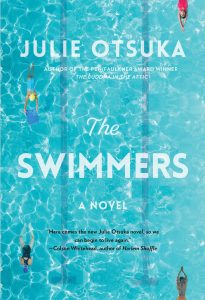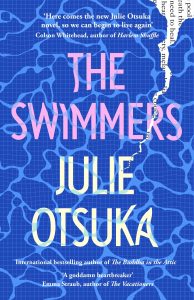 Published by Knopf US/Fig Tree UK 22 February 2022
Published by Knopf US/Fig Tree UK 22 February 2022
192pp, hardback, $21.99/£12.99
Reviewed by Elsbeth Lindner
This third novel from highly-regarded, multiple award-winning Otsuka is a heartbreaker.
Short in length and simply phrased, it is divided into two parts, the first devoted to a below-ground swimming pool in a Californian city; the second to the life – and death – of Alice, one of the swimmers.
Written in the first person plural and then the vocative, the book offers switches of intimacy and mood. At the pool, an element of social satire is evident and embraced. But Alice’s story is inescapably tragic, a mother/daughter narrative of intimacy and and regret.
Both halves are full of lists, accumulations of detail which Otsuka uses to convey brilliant flashes of identity and contemporary notes. In the dreamy other world – choose your symbol – of the pool, for example, there are the swimmers, their abilities and needs, the pool’s rules, the debris hoovered up from its floor, and many more catalogues: ‘Up above there are wildfires, smog alerts, epic droughts, paper jams, teachers’ strikes, insurrections, revolutions, blistering hot days that never seem to let up.’
And then there are the cracks. At first just a single, concerning blemish on the pool floor, soon this flaw will develop into an infestation that will challenge the pool community and bring about its closure, setting up the template for the novel’s second part.
Swimming laps had allowed Alice some brief respite from her advancing dementia. Its loss strips her of that comfort, leaving her unprotected from uninterrupted decline and ultimately the irrevocable switch from her own home to an institution. The ‘you’ addressed in this section is Alice’s daughter, a writer, childless, middle-aged and distant, invoking irresistibly the notion that the novel is autobiographical. For Alice is of Japanese origin, who, as a child, was deported with her family to one of the notorious American internment camps during World War II.
Both Alice’s and her daughter’s characters are evoked in lyrical sentences, all the more plangent as, for Alice, words and meaning drift away from her: “She does not remember what she ate for dinner last night, or when she last took her medicine. She does not remember to drink enough water. She does not remember to comb her hair.” Shortly, she will lose her freedom too, as she is moved to Belavista, a ‘long-term, for-profit memory residence’ for the ‘next and final’ phase of her journey.
Otsuka’s intention and Alice’s destination are never hidden, the novel’s prose is never excessive, yet this narrative delivers immense power, in both its specificity and wider relevance. As the pool was a place of community and togetherness, so the Belavista is a site of separate trajectories, each patient traversing a path of lesser connection and loss, into isolation and silence.
Other novels of Alzheimer’s and associated dementias (Alice has Pick’s disease, relatively rare) exist, some featuring central characters named Alice* – but Otsuka’s immaculate understatement renders afresh the ghastly transitions of the experience, as well as the wider repercussions. Alice may fade but her after-image will not be so easily expunged.
*Still Alice by Lisa Genova
